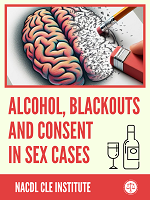
Alcohol, Blackouts & Consent in Sex Cases: Memory, Toxicology & Cross
Program Overview: Defending sexual assault cases that involve alcohol consumption, memory impairment, and questions of consent often hinge on understanding the science of intoxication, blackouts, and perception, as well as legal strategies that address false confessions, unreliable identifications, and evolving consent standards.
Defense counsel must have a deep understanding of the scientific and legal complexities of these cases in order to form an effective defense strategy. This comprehensive training program brings together leading experts in forensic toxicology, psychology, and legal advocacy to provide defense attorneys with a rigorous, science-backed approach to dismantling prosecutorial narratives, exposing unreliable testimony, and ensuring that juries are properly educated on the complexities of memory, intoxication, and consent. You'll explores critical mistakes and misconceptions encountered in these cases, including errors in memory reconstruction after an event, incorrect inferences, cognitive schemas, suggestibility, contamination and misinformation, mistakes of fact and more.
Key Learning Objectives:
- Alcohol, Memory, and Consent - understanding the science behind alcohol-induced memory gaps, distinguishing blackouts from unconsciousness, and challenging claims of extreme intoxication using forensic toxicology.
- Eyewitness Testimony and Identification - addressing how intoxication affects perception and recall, leveraging research to challenge unreliable testimony, and understanding factors that impact eyewitness reliability.
- False Confessions and Investigative Bias - recognizing coercive interrogation tactics, utilizing expert testimony on false confessions, and filing motions to suppress unreliable evidence.
- Consent and Legal Complexities - examining affirmative consent laws, crafting jury instructions to clarify consent and intoxication misconceptions, and applying mistaken belief defenses like the Mayberry defense.
- Forensic Science in Defense strategy - Interpreting toxicology reports, evaluating claims involving date rape drugs, and subpoenaing medical and psychiatric records to support the defense.
- Effective Cross-Examination - structuring strategic questioning, exposing inconsistencies in accuser statements, challenging forensic evidence, and using social media and prior statements for impeachment.
Defense attorneys who complete this training will leave with a deeper understanding of how to leverage scientific evidence, dismantle prosecutorial assumptions, and craft compelling defense narratives. With the stakes so high in these emotionally charged cases, having the right knowledge and strategies can mean the difference between conviction and acquittal.
CLE Credit: Up to 4 hours of self-study CLE credit, where authorized. Please confirm with your state's CLE commission to ensure this program is available for self-study CLE certification.
Presentations Included:
- Utilizing Toxicology to Defend Sexual Assault Allegations | Sandy Feinland & Dr. Nikolas P. Lemos, Ph.D
- Alcohol, Capacity, Consent and Reasonable Belief in Sexual Assault Cases | Kathleen Conye
- Date Rape: Drugs, Alcohol and Memory in Sexual Assault Cases | Lisa Wayne
- Cross-Examining the Adult Complainant | Jason Downs
- BONUS: Winning Opening Statements in Consent Cases | Guy Cardamone
 Order by Mail or Fax by downloading a PDF order form. Call (202) 465-7661 to order by phone!
Order by Mail or Fax by downloading a PDF order form. Call (202) 465-7661 to order by phone!
Prices
- List Price $109.00
- Member Price $99.00